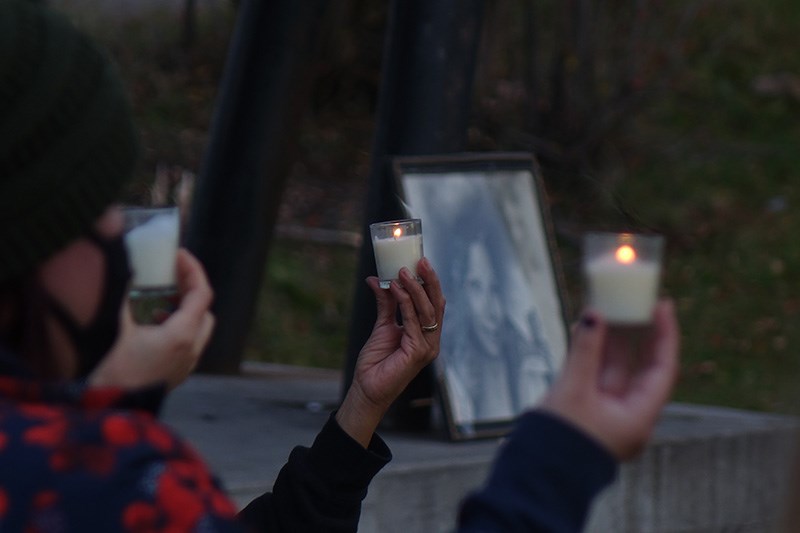People with family members who’ve been murdered or gone missing shared some of the effects that those losses had on them during a memorial walk and candlelight vigil in Thompson Oct. 4.
Held to mark the provincial day of awareness and national day of remembrance for missing and murdered Indigenous women and girls (MMIWG), the walk began at the office of Manitoba Keewatinowi Okimakanak (MKO), which organized the event, and ended at MacLean Park in front of City Hall.
“I lost my mom Linda Bighetty when I was very young,” said Jenny Lay, who works as a project and event co-ordinator with MKO’s MMIWG liaison unit. “She was murdered and because of that I grew up in a lot of systems that failed me. The systems that we have in place right now, they don’t help, they don’t make things easier for me or people like me.”
“There needs to be better mechanisms for those children left behind not to end up in a system or involved in a lifetime of institutions, whether it’s the child welfare system, hospitals, prisons,” said MMIWG liaison unit manager Hilda Anderson-Pyrz. “That happens a lot if we’re not giving those young children the tools and the supports that they need when they lose a mother to homicide or if their mother goes missing. We need to ensure that those children are properly cared for.”
Felicia Lobster, who led the walk and performed an honour song at the outset of the MacLean Park ceremony and a jingle dress dance at the end of it, has also been impacted by violence against Indigenous woman.
“I lost my older sister to murder a couple years back, 2011,” said Lobster. “It’s almost been 10 years now. I always remember her in spirit every time I dance.”
The impacts of someone being murdered or going missing extend beyond immediate family, said Thompson Mayor Colleen Smook, remembering when George and Melinda Wood came to her snowmobile shop many years ago with their young daughter Christine Wood, who was killed in Winnipeg at the age of 21 in 2016.
“When I first heard she was missing, it was definitely a true family member and sometimes they say it takes someone really close to you to totally appreciate that it’s not just one family, it’s not just your family that this happens to,” said the mayor.
The issue of missing and murdered Indigenous women was first brought to attention by women themselves, said MKO Grand Chief Garrison Settee, but it is not a women’s issue.
“Women were crying out, something needed to be done for our sisters and I asked myself where are the warriors in this picture?” said Settee, remembering a resolution regarding MMIWG he and Perry Bellegarde, now Assembly of First Nations (AFN) national chief, passed at an AFN assembly back when Settee was chief of Pimicikamak Cree Nation. “Where are the chiefs in that picture? I apologized to all our sisters in that assembly. I said we have failed you by not being the warriors we’re supposed to be.”
Without everyone working toward a future in which Indigenous women and girls are no longer much more likely to go missing and be murdered than Canadian women as a whole, the problem can’t be solved, said Lay.
“Everyone needs to make a commitment because that’s what a pathway for change is,” she said. “If not every person changes the way their heart feels things or sees things, then it’s never going to change.”




